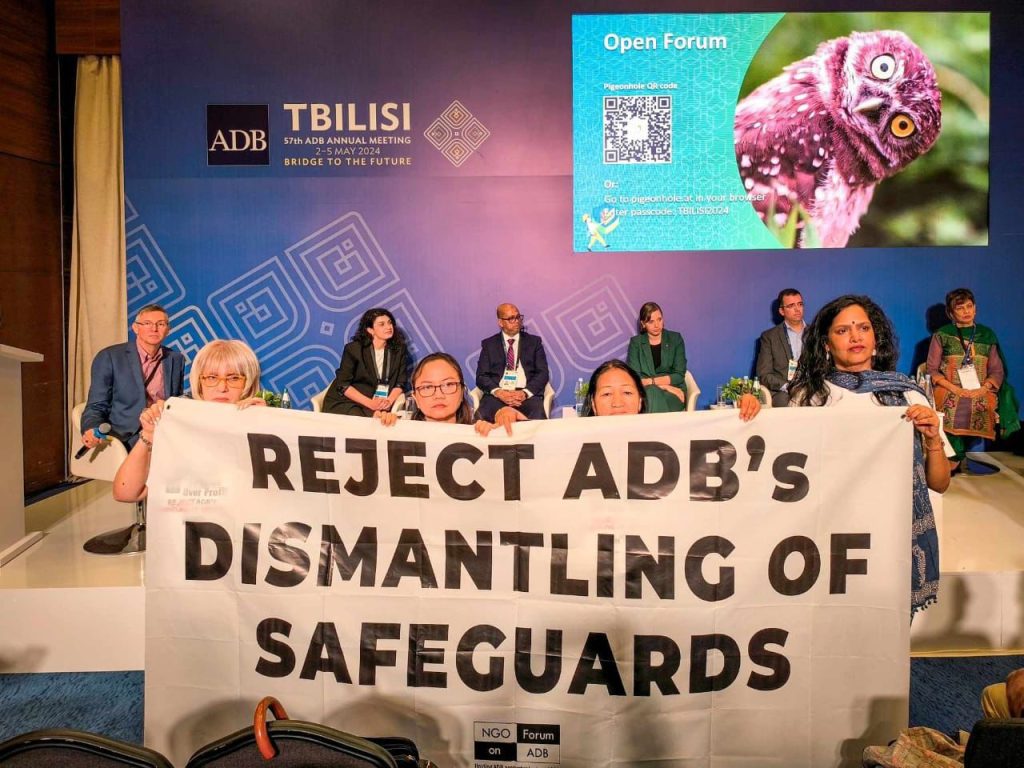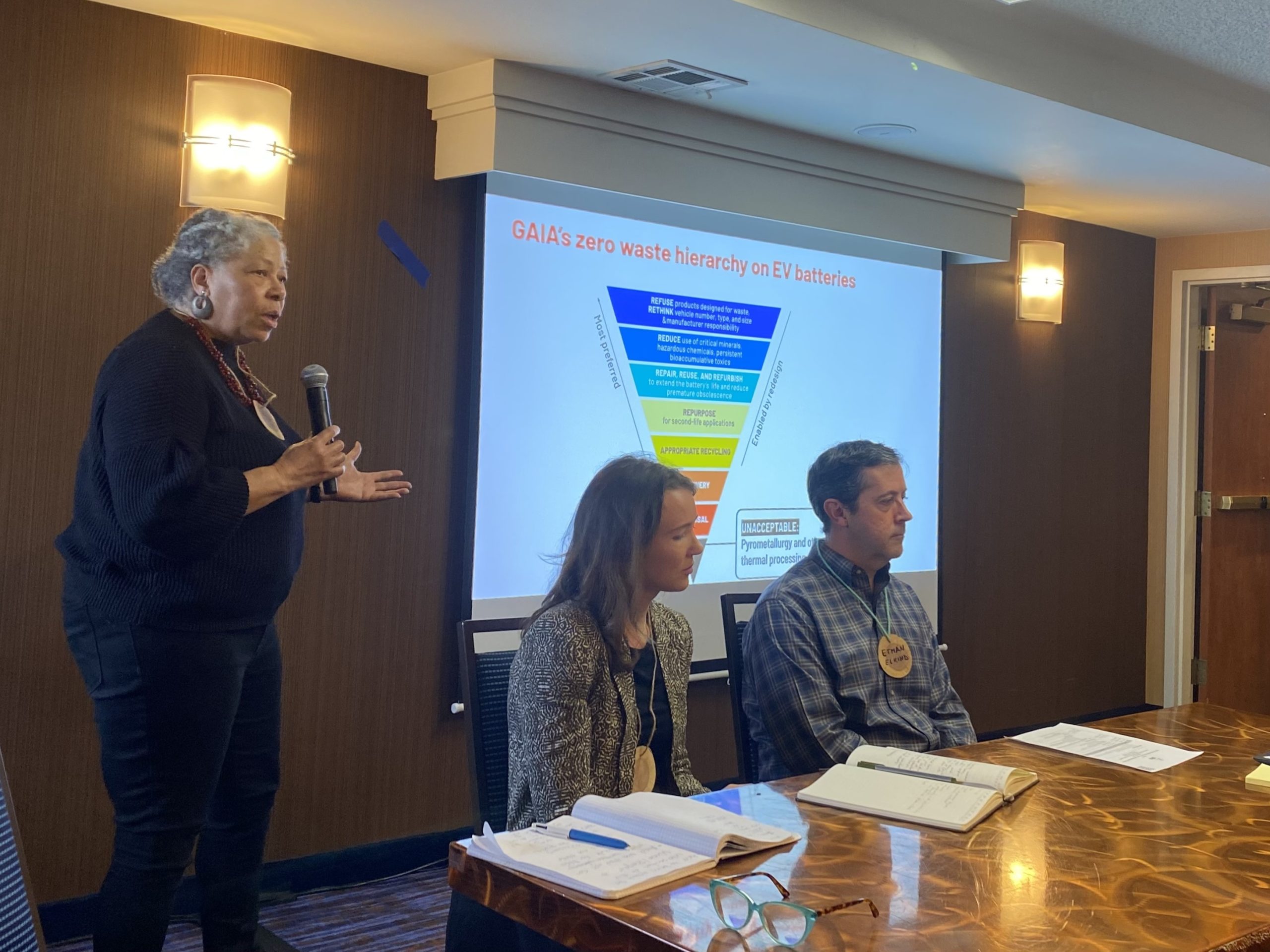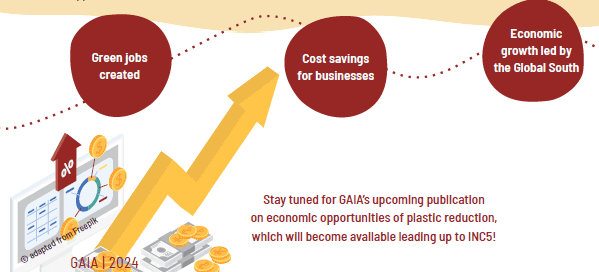
Tbilisi, Georgia – On Sunday (May 5), civil society groups from different regions collectively raised their objections over the Asian Development Bank’s (ADB) regressive safeguards policy which aims to avoid, protect, and mitigate environmental and social harms from its operations. As soon as the banner was unfurled at the end of the Safeguards Session on May 5, other civil society groups and representatives of affected communities stood with their protest shirts stating “Protect people and planet over profits”.
The Bank prepared the draft Environmental and Social Framework with 10 standards for public consultation in light of the ongoing review and update of ADB’s 2009 Safeguard Policy Statement . GAIA has participated in the process of raising their recommendations and critical analysis on the proposed safeguards policy.
Since the beginning of the consultations last year, GAIA and other civil society movements have objected to the weakening of the safeguards by failing to recognize international environmental and social conventions and the minimum standards for protecting people and the environment. From the beginning of the review process, GAIA has raised that persistent organic pollutants known to be a byproduct of incinerators and hazardous waste are already being governed for bans and phaseouts but ADB has omitted these sparsely mentioned conventions from the 2009 Safeguards Policy in the draft.
“The Basel, Rotterdam, Stockholm, and Minamata Conventions need to be in the draft policy to guide both the Bank and borrowers on how to ensure that no harm will be done from its project. ADB must show that it is a responsible international development actor upholding the highest standards of environmental and social protection and not an institution playing above international law”, Mayang Azurin, GAIA Asia Pacific Deputy Director said.
Groups also dissented over the lack of guidance for meaningful consultations and guidance on addressing reprisals given that ADB’s high-risk projects are often invested in countries with limited safe spaces for civic participation.
GAIA also objected to the use of pollution and carbon offsets in the draft as a license for polluters to continue with its harmful projects while on the other hand, has not given priority and the right of communities to say no to harmful projects.
“A weakened safeguards mean more harm to the community and the environment. Local communities, indigenous peoples, and local civil society organizations have raised evidence of the harms of burn technologies on waste. ADB’s safeguards are unable to avoid these impacts because it has just been paperwork without truly consulting the grievances of impacted communities. The triple planetary crisis of biodiversity loss, pollution, and climate change must push the ADB to avoid delays in global commitments in addressing these issues.”, stated Abdul Ghofar, Pollution and Urban Justice Campaigner from WALHI Indonesia, during a session organized by the ADB’s Accountability Mechanism
Safeguards policy has been a critical tool for communities to hold the ADB accountable for its harmful projects. GAIA has monitored billions of dollars invested by the Bank through loans, technical assistance, and grants on waste-to-energy (WtE) incinerators, refuse-derived fuel (RDF), co-firing coal with wastes, carbon capture storage (CSC) technologies, harmful and exclusionary waste management projects in the Philippines, Indonesia, Bangladesh, India, Thailand, Malaysia, Cambodia, Maldives, Vietnam, Myanmar, Uzbekistan, Marshall Islands, Mongolia, and China. The application and implementation of safeguards in these projects have been unsatisfactory.
Azurin, who spoke in a panel on community voices on just energy transition, stressed that ADB proposals to use either biomass or plastic waste to co-fire with plants perpetuate the use of coal as fuel while creating new problems. “These technologies create new problems and require government support and subsidies which are better spent for real renewable energy and zero waste solutions,” she said.




























